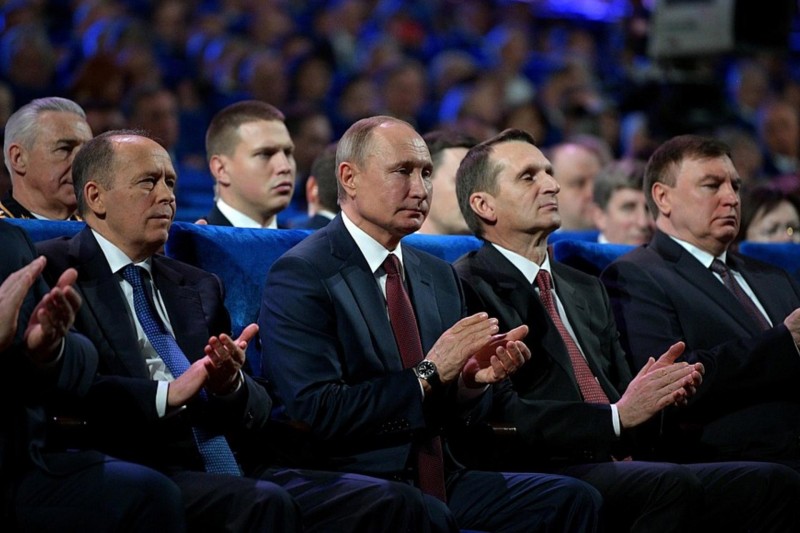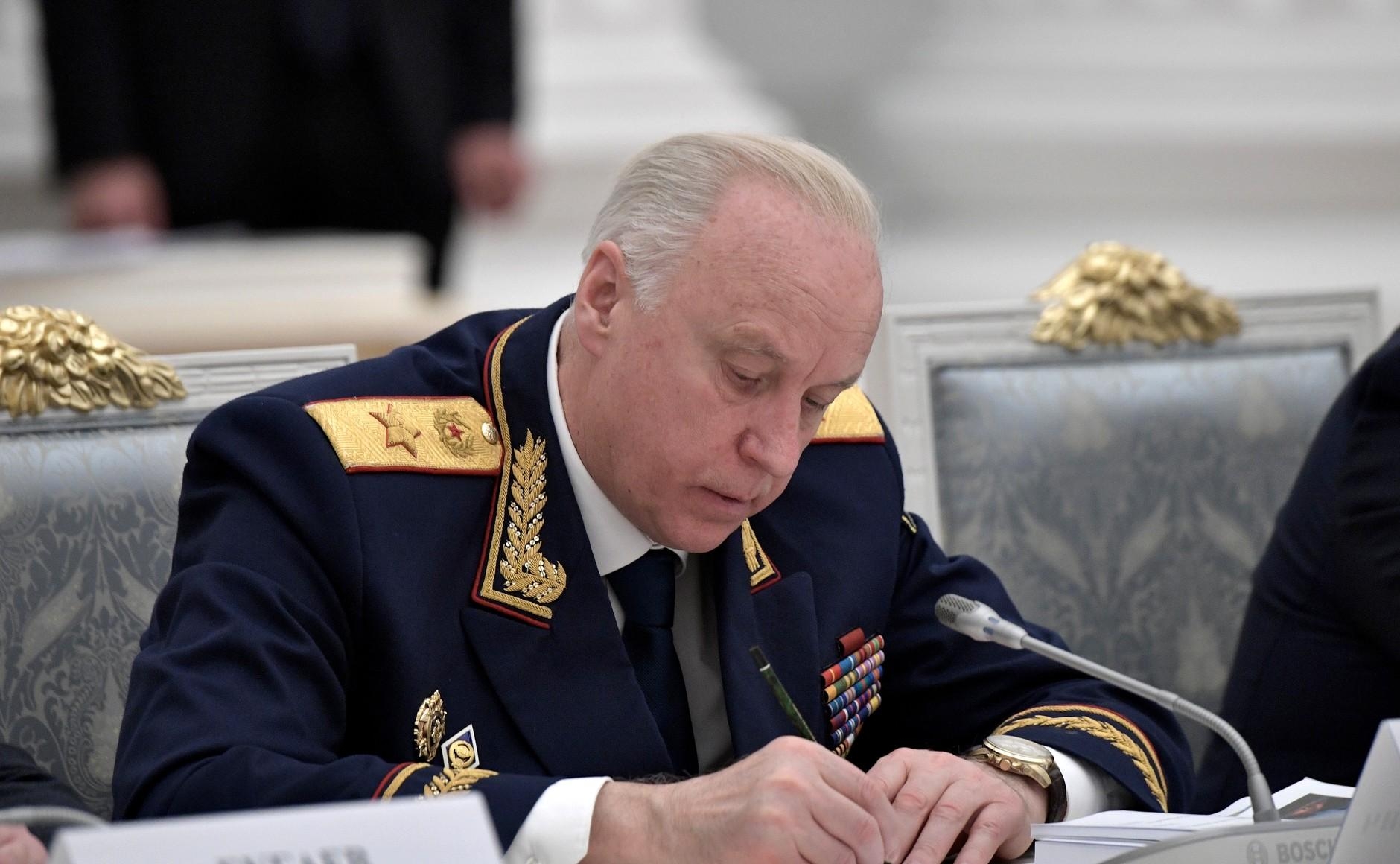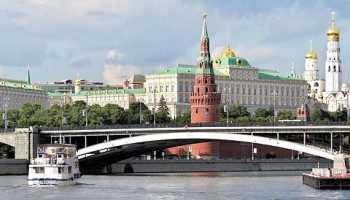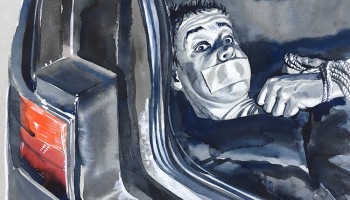Sergei Korolev, who was appointed to a key FSB position earlier this year by President Vladimir Putin, is connected to leaders in the Russian criminal underworld accused of dozens of murders and kidnappings.
Editor’s Note: This is an English translation of a story originally published by OCCRP’s Russian member center iStories on March 11.
Earlier this year, Russian President Vladimir Putin appointed a man named Sergei Korolev as first deputy director of the Federal Security Service (FSB), the country’s main security agency.
Prior to obtaining this high-level position, Korolev headed the FSB’s Economic Security Service, and before that, the agency’s Directorate of Internal Security. That’s where the official version of his biography ends.
But iStories spoke with Korolev’s acquaintances — who cannot be named in this story for security reasons — and examined documents from several high-profile criminal cases in which his name appeared.
As it turns out, he has personal connections with several well-known leaders of the Russian criminal underworld who have been accused of kidnappings and contract murders. Though some details about these relationships have appeared in the press, this seemed to have no effect on his career. Indeed, his colleagues’ respect for him seems only to have grown.
The Killers from Irkutsk
Korolev was born in 1962 in Frunze, the Soviet name for the Kyrgyz capital of Bishkek.
According to several of his acquaintances, he came from a military family with good connections: His late father was hunting buddies with Viktor Zubkov, who worked with Vladimir Putin in the St. Petersburg mayor’s office in the early 1990s, later served as prime minister, and now chairs the board of the state oil giant Gazprom.
Korolev's former colleagues, as well as members of other law enforcement agencies who crossed paths with him, say that, despite his connections, Korolev’s own career was built on being "a savvy operative" — a high form of praise in law enforcement circles.
But Korolev’s career has also been punctuated by multiple public revelations that he has connections to underworld figures. If these had no apparent impact on his rise to the top, he may have Putin’s social circle to thank for it.
One such crisis occurred in 2004. That March, criminal investigators from the St. Petersburg police detained Oleg Makovoz, a businessman from Irkutsk, a region in Siberia, who presents himself as a public figure and politician. He even ran for parliament at one point. But according to the police investigation, Makovoz was a member of a criminal group based in his home region.
In St. Petersburg, Makovoz ran a security firm that employed former special forces personnel who had been involved in a series of high-profile contract murders. (He was later sentenced to 23 years in prison for kidnapping, exotortion, and the murder of another criminal leader.)
At the time the relationship emerged, Korolev was working in the FSB’s Economic Security Service for St. Petersburg and the surrounding region, where his tasks included combating organized crime and supervising law enforcement agencies. But police investigators found he was also communicating with Makovoz during this period. The relationship appeared to be a mutually beneficial one.
In his defense, Korolev’s colleagues say that Makovoz was a valuable source of information, and that the relationship between operatives and their sources is one of the most complex, even philosophical, aspects of intelligence work. In order to receive valuable information, one must give something in return — and it’s not always easy to draw the line in the right place.
In addition, sources said, the Makovoz case was part of a larger war of influence between the police and the FSB in St. Petersburg. At the time, they said, Korolev was feuding with Vladislav Piotrovsky, who headed the city’s criminal police force. In such wars, it’s common for opposing sides to discredit each other by deliberately exaggerating the facts or presenting them in a one-sided way.
In any event, as a result of the Makovoz case, Korolev was transferred to the Federal Tax Service. Its head at the time was Anatoly Serdyukov — the son-in-law of Korolev’s father’s old hunting partner, Viktor Zubkov. Later, Serdyukov became defense minister and Korolev became his adviser. But as further events showed, Korolev maintained his ties with the criminal underworld of St. Petersburg.
The Mysterious “Shakefoot”
In 2008, Spanish police conducted a large-scale special operation called Troika that resulted in the arrest of "leaders of the Russian mafia," as the Spanish media described them. Among those arrested was Gennady Petrov, a well-known St. Petersburg businessman.
In 2010, Spanish authorities released Petrov on bail. A short time later, he and another suspect, Leonid Khristoforov, returned to their native St. Petersburg for medical treatment and never came back to Spain, despite promising to do so. They were put on an international wanted list, but the case fizzled out. Russian authorities reported to the Spanish court that they had nothing to charge them with, and they were never forced to return.
Russian law enforcement had their reasons for not helping their Spanish counterparts, according to investigative materials seen by reporters.
According to wiretaps of Petrov's phone conversations, the alleged organized crime figure was in touch with some of Russia's highest-ranking officials, including then-Prime Minister Viktor Zubkov, Defense Minister Anatoly Serdyukov, and many others. In his conversations, Petrov referred to Zubkov and Serdyukov familiarly as “Vitya” and “Tolik.”
Petrov was also on close terms with high-ranking law enforcement officials. One standout among them was a man who appears in the wiretaps only by the nicknames “Boltai-Noga” or “Gulai-Noga” (which could be translated as “Shakefoot” or “Wanderfoot”).
According to wiretaps published in 2019 by The Insider, this mysterious Shakefoot worked for Defense Minister Serdyukov, and worked with him to help Petrov push through the appointment of certain people to key government positions.
For example, Petrov actively discussed with his interlocutors the appointment of Alexander Bastrykin to chair the Investigative Committee, Russia’s top law enforcement body. In 2007, the day Bastrykin's candidacy was approved by the Federation Council, Petrov called Leonid Khristoforov, who had been arrested along with him in Spain:
“The man has been appointed,” he said. “Remember, I told you? So that's it — he's been appointed. Very high up," Petrov bragged.
“Oh, good!” Khristoforov replied.
On the same day, Petrov received a phone call from a man referred to as “Nikolaevich.”
“You heard about Sasha [Alexander Bastrykin], right?” Nikolaevich told him. “That's it, they've appointed him."
“Good, my gosh," Petrov rejoiced.
This “Nikolayevich” turned out to be Nikolay Aulov, then a senior Interior Ministry official. Materials from the Spanish criminal case show that the same Shakefoot had helped Aulov himself get promoted. The year after this conversation took place, in 2008, Aulov became deputy director of the Federal Service for Drug Control.
So who was the mysterious and influential Shakefoot, who helped Petrov get people appointed to the highest government positions? The Insider suggested that he was, in fact, Sergei Korolev. This conclusion was based on several pieces of evidence:
Like Korolev, Shakefoot worked as an adviser to Defense Minister Anatoly Serdyukov.
Like Korolev, Shakefoot’s first name is Sergei.
Like Korolev, Shakefoot was connected to the FSB: Petrov reminded his son not to forget to congratulate Shakefoot on December 20, State Security Agents’ Day.
Like Korolev, Shakefoot’s birthday is July 25.
iStories found additional clues that the man behind the nickname “Shakefoot” could be Korolev. In November 2007, Gennady Petrov called his son Anton:
“Yesterday I went to see Shakefoot. There was this... Minaev, a shooter, a sniper,” Petrov said to his son.
“That's his deputy," Anton Petrov responded.
“Ah, I didn't even know. I asked him: ‘Is he a general?’ He says: ‘No, a sniper.’”
“He decides a lot of things for him. His right-hand man. They say he doesn't know anything about the job, but he’s his right hand," Petrov’s son said.
In this conversation, Gennady Petrov most likely mixed up the last name of the person he met when he saw Shakefoot. Few people fit the description of the sniper he met as well as Igor Medoev, who worked as Sergei Korolev's deputy in the Defense Ministry. Before that he had earned fame as one of the best snipers in the country as a member of the FSB’s Special Purpose Center, a counter-terrorism unit.
Shakefoot was a cautious man. He preferred to resolve issues in face-to-face meetings with Petrov, not on the phone. But on one occasion, Spanish law enforcement authorities did manage to record his voice. In July 2007, according to the wiretap published by The Insider, the younger Petrov called his father, then handed the receiver to Shakefoot so that he could personally invite him to his birthday party:
“Greetings, Sergei,” Petrov told him. “I have a big request, that for my 60th birthday, you should definitely be there."
“I will definitely be there,” Shakefoot replied.
Reporters played this recording to two people who know Korolev, and both confirmed without hesitation that it was his voice on the tape. They said that Korolev and Petrov continue to communicate to this day, "as all of St. Petersburg knows.”
Big Brother
In 2018, Austria extradited to Russia a man named Aslan Gagiev, who is accused by Russian law enforcement of heading an organized criminal group and ordering murders. According to Russian investigators, "the criminal organization created and headed by Gagiev began its activities in 2004 and had more than 50 participants. As a result of criminal activity, 60 people were killed in Moscow, the Moscow region, and the Republic of North Ossetia-Alania.”
However, as Novaya Gazeta reported in 2018, Gagiyev's group was not a typical criminal association. Calling themselves “The Family,” they saw themselves as an arm of the justice system that filled in when Russian law enforcement agencies didn’t do their jobs. Some members of the "Family" even seriously believed that they were a classified unit of the FSB.
They did sometimes provide a form of justice — albeit violent and extrajudicial — to victims of crimes ignored by the state. For example, the Family targeted members of a gang that abducted children in North Ossetia in the mid-2000s. The leader of this gang was politically connected, which apparently lent them a degree of protection from law enforcement. But when the Family took up the case and started murdering gang members, the kidnappings stopped.
But they didn’t only kill violent criminals. Bystanders and people caught up in financial disputes were also targeted by The Family. Gang members also turned on each other, fearing betrayal from within.
Still, Gagiev was popular and respected in North and South Ossetia, where he was known as Big Brother. He took part in the storming of the school seized by terrorists in Beslan in 2004, fought alongside his "Family" in the 2008 war in Georgia, and did charity work.
When Russia sought his extradition from Austria, Gagiyev and his lawyers insisted that he would be in great danger there because he had been previously tortured by FSB operatives. (An independent Austrian expert confirmed this after examining Gagiyev's injuries).
There is only one positive reference to a Russian civil servant in Gagiyev's testimony to the Austrian court. Gagiyev did not give his last name, but described the man with gratitude and respect.
"I was taken out of Russia by the head of the ninth service of the FSB. He said there was nothing he could do to help me. He said: ‘There is a solution.’ He gave me ten thousand dollars and decided that this was the only thing he could help me with," Gagiev told the Austrian court, according to records obtained by reporters.
By the "ninth service" of the FSB, Gagiyev most likely meant the Directorate of Internal Security, which at the time was headed by Korolev. Several sources confirmed to reporters that Korolev and Gagiev knew each other well.
Why would Korolev help Big Brother? According to sources, Korolev owed something to Gagiyev, who once helped him in a critical situation. The nature of that situation is unknown, but Gagiyev often risked his life to save others. For example, on one occasion he voluntarily submitted himself as a hostage to Chechen fighters who had kidnapped a girl to obtain a ransom from her family. The guerrillas let the girl go, and Big Brother sat in a pit for ten days until they were paid off.
The FSB leadership was aware that Gagiev and Korolev knew each other. When the Gagiev case was being discussed in the media, Korolev was allegedly summoned by the director of the FSB, Alexander Bortnikov, according to one of Korolev’s acquaintances.
“Someone else would have started to play around, to try to invent something, but [Korolev] explained everything plainly. He acted like a man," his acquaintance recalled with pride.
And this is the main mystery of Korolev’s personality. Whenever his compromising connections came to light, he not only seemed to get away with them, but came out of the situation with an even better reputation among his colleagues.
While working on this story, reporters repeatedly asked Korolev’s acquaintances: "How could he be appointed deputy FSB director while having so many connections among underworld leaders?"
Both Korolev’s friends and former enemies answered roughly in the same way: “Who is not without sin? At least [Korolev] has never betrayed anyone. The president appreciates such people.”
In this sense, Putin’s personnel policy bears little resemblance to the principles of the rule of law. Rather, it more closely resembles the logic of criminal bosses, for whom loyalty is a candidate’s main advantage.
Korolev did not respond to requests for comment.








